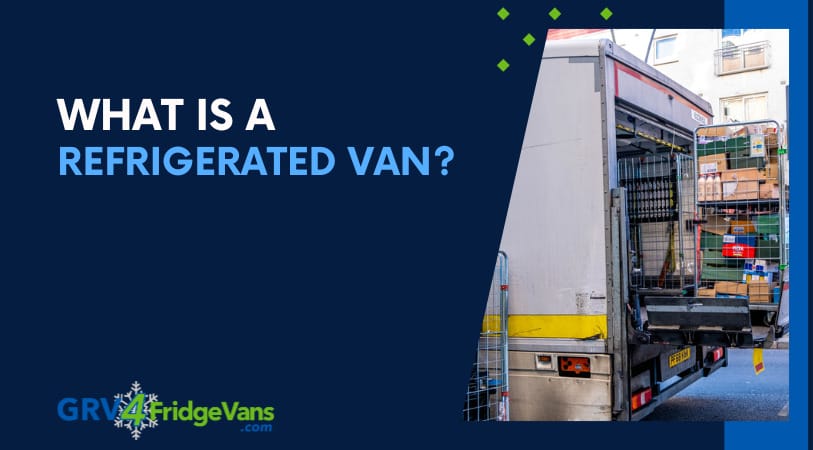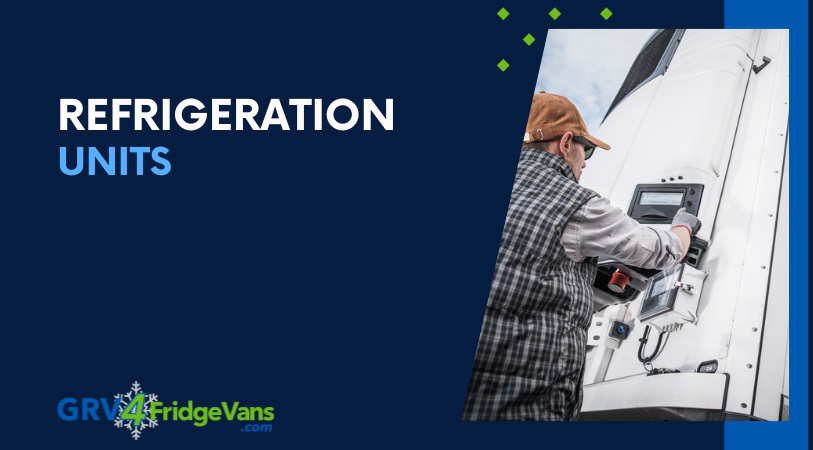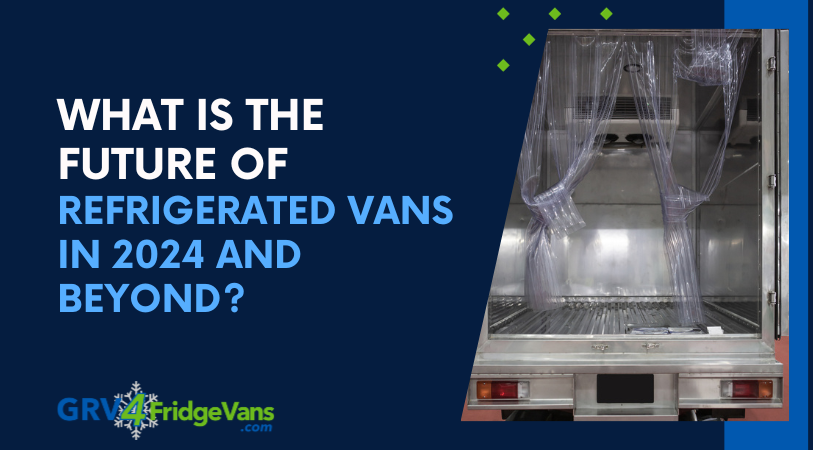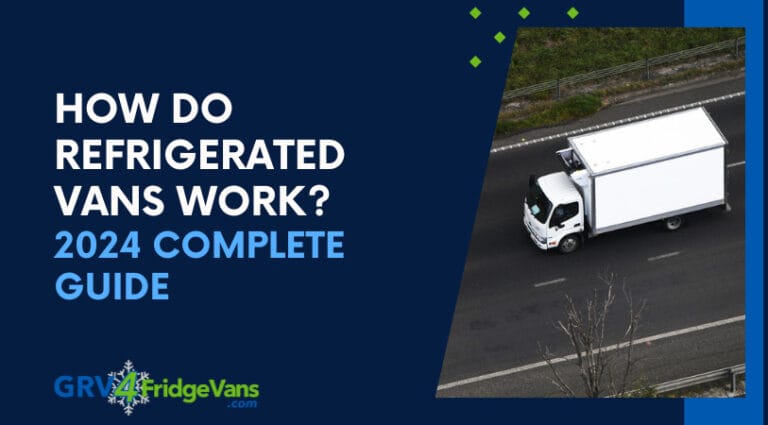Consumers today are very demanding. They want easy access to the things that they love, and this means businesses have to work harder to deliver. The transportation of perishable goods is a critical component of various industries, which is why the importance of the humble refrigerated van cannot be overstated.
These specialised vehicles play a crucial role in maintaining the integrity and freshness of a wide range of products – from food and pharmaceuticals to floral arrangements. Companies large and small put these units to work to help deliver their business objectives.
As we step into 2024, let’s delve into the workings of refrigerated vans, exploring the technology behind these mobile cold storage units. We’ll also look at how this sector is changing to meet the demands of the consumer.

What is a refrigerated van?
With a few small modifications, a regular van can become a temperature-controlled van capable of carrying and storing perishables. These vans are popular across a wide range of industries for a lot of diverse purposes. Some sectors that use refrigerated vans include:
- Food and beverage providers
- Meal prep delivery
- Caterers
- Florists
- Chemical manufacturers
- Pharmaceutical companies
Using a refrigerated van allows companies to make better decisions about the delivery of products. While a dairy supplier would once have had to limit their deliveries to a certain area within a commutable distance, with a refrigerated van, they can greatly expand their target market.
Small companies may also use their refrigerated van for additional storage, as this would be cheaper than investing in additional storage space and freezer units.

Understanding the basics
If you’ve ever been inside a regular van on a hot day, you’ll know that they are typically quick to overheat. And on a very cold day, you wouldn’t be surprised to return to your van and find a bottle of water left behind has frozen solid.
Between heat from the engine and poor insulation, how exactly do refrigerated vans maintain consistent temperatures? There are a few basic upgrades that are required in order to control the temperature inside a van. These are the basics of van refrigeration:
1. Insulation
Refrigerated vans are built with enhanced insulation to minimise heat exchange between the external environment and the cargo space. This insulation is vital for regulating the internal temperature and ensuring that it remains consistent. Insulated linings can also make the interior of vans easier to clean, which is essential for companies such as food and beverage providers who need to be able to deep clean at regular intervals.

2. Refrigeration units
At the heart of every refrigerated van is the refrigeration unit. This component is responsible for actively cooling or freezing the cargo space to the desired temperature. The choice of refrigeration unit depends on factors such as the type of goods being transported and the duration of the journey. These units are able to maintain ambient temperature or chill to the equivalent of a fridge, freezer, or deep freeze.
3. Temperature control systems
Modern refrigerated vans are equipped with advanced temperature control systems that allow precise management of the internal climate. These systems ensure that perishable goods are kept within specific temperature ranges, safeguarding their quality and safety. These systems also help with monitoring, so you can ensure you remain compliant with regulations.

The working mechanism
Now we know the fundamentals of how refrigerated vans work, we can now look at the components required to keep them functional. There are so many variations in different van configurations, so before you invest in a refrigerated van for your business in 2024 and beyond, it’s vital that you understand the different variations available.
1. Cooling mechanism
Refrigerated vans use a vapour compression refrigeration cycle, similar to household refrigerators. This cycle involves the compression, condensation, expansion, and evaporation of refrigerant gas to absorb and release heat, effectively cooling the interior of the van.
2. Power sources
Refrigerated vans can be powered by various sources, including electric power, vehicle engine power (utilizing the vehicle’s alternator), or independent diesel-powered generators. Electric-powered vans are more environmentally friendly, while diesel-powered options offer greater flexibility in remote or off-grid areas. For small companies using their vans for extra storage, an independent power source will be essential.

3. Dual temperature zones
Some refrigerated vans are designed with dual temperature zones, allowing businesses to transport goods with different temperature requirements in the same vehicle. This versatility is particularly valuable for companies dealing with a diverse range of perishable products. Examples include catering companies that need to transport raw ingredients and prepared food at different temperatures.
Factors influencing performance
With the cost of living on the rise, companies are always looking for ways to reduce their overheads. This is why the quality of the refrigerated vans used by a company is such an important factor to consider. Cheaper vans will be more expensive to run and will ultimately cost more in the long term. These are some of the factors that will influence the performance of a van:
1. Insulation quality
The effectiveness of insulation directly impacts the performance of a refrigerated van. High-quality insulation minimises heat transfer, ensuring that the internal temperature remains stable, even in varying external conditions. Without insulation, the cooling mechanism will need to work a lot harder to maintain a consistent temperature, and this will translate to higher running costs. It could also lead to a higher frequency of breakdowns and malfunctions.

2. Airflow and circulation
Proper airflow and circulation within the cargo space are crucial. This prevents temperature stratification, ensuring that the entire load is evenly cooled or frozen. Ventilation will often be essential for maintaining perishables such as food or flowers. For chemical and pharmaceutical companies, ventilation will need to be carefully managed.
3. Monitoring systems
Advanced refrigerated vans are equipped with real-time monitoring systems. These systems provide constant updates on the internal temperature, ensuring that any deviations are detected and addressed promptly. Modern systems will allow you to access this information remotely, ensuring better oversight and management of your fleet.

What is the future of refrigerated vans in 2024 and beyond?
As technology continues to evolve, the future of refrigerated vans holds exciting prospects. The industry is witnessing advancements in insulation materials, refrigeration efficiency, and the integration of smart technologies.
From real-time tracking and monitoring to improved energy efficiency, these innovations are set to redefine the capabilities of refrigerated vans in the years to come. The workings of refrigerated vans are a blend of engineering precision, thermal dynamics, and technological innovation.
As we navigate the intricacies of transporting perishable goods, these mobile cold storage units stand as pillars of reliability, ensuring that freshness is delivered to consumers’ doorsteps.
Conclusion
Refrigerated vans are an essential component for so many businesses, yet many of us never give them a second thought. Consumer demand will always shape advancements in this sector. In 2024 and beyond, we can expect efficiency and smart technology to pave the way for AI-optimised fleet management.
Companies will be able to see and manage their fleets at a glance and vans will be equipped with smart technology to increase fuel efficiency. This will help to reduce running costs and minimise the risk of failure in cooling units that can result in catastrophic loss of products.




